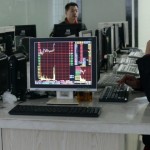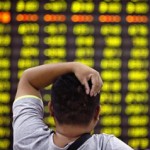China Shares Fall Sharply as Regulators Investigate Brokers

Chinese officials have ramped up scrutiny of the securities industry
Chinese authorities’ investigations into two major Chinese brokerages over suspected violations drove shares in Shanghai sharply lower Friday.
The Shanghai Composite Index fell 4.6% to 3468.13, wiping out most of its gains this month. The benchmark fell as much as 5.2% intraday.
China shares are still up 2.9% month-to-date, and up 17% from their August low.
Hong Kong’s Hang Seng shed 1.7%, putting it down 3% week-to-date.
On Thursday, China’s largest stock broker, Citic Securities Co., said it would cooperate with the country’s stock regulator in an investigation of the firm for suspected violation of securities rules. Guosen Securities, China’s third-largest broker by assets, said it is under investigation for suspected violations, too, according to a company filing.
Citic fell by the 10% limit allowed by regulators in Shanghai, and was 6.1% lower in Hong Kong. For the week, the stock is off 12.8% in Shanghai and down 8.7% in Hong Kong.
Guosen fell 9.9% in Shenzhen on Friday, and is off 6.4% for the week.
Shares of Haitong Securities fell 3.8% in Hong Kong, before the brokerage issued a trading halt after the market opened without citing reasons.
In Japan, shares fell 0.3% Friday after the Nikkei neared the 20000 level earlier this week. Australia’s S&P/ASX 200 fell 0.2% and South Korea’s Kospi fell 0.1%.
Chinese authorities’ increased scrutiny of the securities industry is part of a crackdown that has ranged from targeting “malicious” short sellers to arresting star fund managers in the wake of the summer stock rout. The Shanghai Composite Index, which fell more than 40% from peak to trough during the summer, is now up more than 20% from its August lows.
Analysts say officials’ moves aim to drain leverage and speculation from the market. Investors who borrowed heavily to buy shares fed a yearlong rally through June, though the unwinding of those loans also accelerated losses over the summer.
A two-month rebound in margin loans has stalled recently with loans reaching 1.22 trillion yuan ($190.94 billion) as of Thursday, according to Wind Information Co.
Loans fell below 1 trillion yuan in late September, when the market’s fall forced the unwinding of bets by brokerages.
Regulators also have said they are looking for signs of irregularities in the industry. Earlier this week, the quasi-regulatory Securities Association of China said Citic overstated its swap transactions numbers between April and September.
“The government wants to foster a stock market that can support the real economy, not one that allows speculative investors to profit from derivatives products,” said Guotai Junan’s analyst Zhang Xin.
Earlier this week, metals including copper and nickel fell to multiyear lows. Metals rebounded Thursday after reports that China will start buying industrial metals to stock up its strategic reserves.
Still, the materials sector on the Hang Seng and Australia’s S&P/ASX 200 indexes is down 3.6% and 4.5% this week, respectively.
The broader S&P/ASX 200 is down 1.1% week-to-date, after jumping 4.1% the previous week, its best week in over a month.
In Japan, a weakening yen lifted the Nikkei close to the 20000 level earlier this week, though shares retreated Friday. The yen was last at ¥122.59 to one U.S. dollar, roughly flat from late Thursday in Asia.
The currency has weakened since mid-October, when it reached as strong as ¥118.04 to one U.S. dollar. A weaker local currency bodes well for Japanese exporters that repatriate profits from abroad.
Investors are also hopeful that Japan’s central bank will extend stimulus, after minutes show officials are open to further action if inflation targets slip out of reach.
On Friday, data showed that consumer prices in Japan fell slightly for the third month in a row in October. The figures indicated that sustained inflation remains elusive despite the central bank’s efforts to spark price growth. Some economists have forecast that flat lining inflation may force the bank and some of its peers to ease again.
Brent crude was last down 0.2% at $45.38 a barrel. U.S. oil prices fell 0.4% on Thursday amid signs of robust U.S. production despite data showing a lower-than-expected increase in U.S. oil inventories and a decline in the number of working oil-rigs in the country.
Gold prices were down 0.3% at $1,066.70 a troy ounce.
Markets in the U.S. were closed Thursday for the Thanksgiving holiday.
Source: WSJ – China Shares Fall Sharply as Regulators Investigate Brokers





























